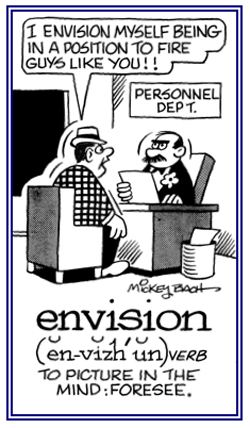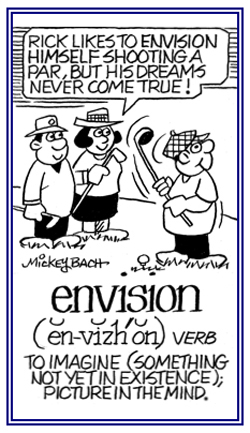vid-, video-, vis-, -vision, -visional, -visionally, visuo-, vu-
(Latin: videre, "to see"; plus words with other related meanings: to notice, noticing, noticed; observe, observing, observed; look, looking, looked; perceive, perceiving, perceived, perception; see, seeing, saw, seen, sight; view, viewing, viewed; manifest, manifesting, manifested; reveal, revealing, revealed, revelelation)
Although many of the words in this unit seem to be from other Latin origins, all of them are etymologically derived from the main Latin videre, "to see" element.
The fovea is located in the eye, a tiny pit located in the macula of the retina (a small spot in the eye where vision is sharpest) which provides the clearest vision of all.
Only in the fovea are the layers of the retina spread aside to let light fall directly on the cones, the cells that give the sharpest image.
2. Conveying feelings of being wanted: This company is in the enviable position of having no real competitors.
When someone is in an enviable situation, others wish that they were also in that status.
Envious programmers desired to know how Roy was able to set up such an efficient web site.
2. To mentally conceive an image or a picture of something, especially as a future possibility: Many people envisage a world where all nations can get along with each other.
Janette and Erin envisaged an opportunity to finally be able to buy their own home.
After overcoming most of her health problems, Shirley envisioned a better life for herself and for her family.
2. Etymology: "something seen in the imagination or in the supernatural", from Anglo-French visioun; Old French vision; which came from Latin visionem, visio, "act of seeing, sight, thing seen"; from the past participle stem of videre, "to see".

Go to this Word A Day Revisited Index
so you can see more of Mickey Bach's cartoons.
2. Spite and resentment at seeing the success of someone else (personified as one of the deadly sins).
3. A resentful desire of something possessed by another person or what other people have, but not necessarily limited to material possessions: The envies of other students were obvious because Bert always knew the answers to the questions that the teacher presented to the class.
Sarina's beautiful hair was an object of envy by anyone who saw her.
4. Etymology: from Old French envie, from Latin invidia, "envy, jealousy"; from invidus, "envious"; from invidere, "envy"; earlier, "look at (with malice), cast an evil eye upon"; from in-, "upon" + videre, "to see".2. To feel a desire to have what another person or people have: James was strongly envying Lina for her programming skills for computers.
This is usually an accelerated ecmnesic (loss of memory for recent events) visual hallucination.
Also translated, "To be rather than to seem to be." State motto of North Carolina, USA; and a motto of the National College of Chiropractic, Lombard, Illinois, USA.
2. The objects, or information, used to prove or to suggest the guilt of someone accused of a crime: So far, the police have no evidence that Hank's brother committed the robbery.
3. The oral, or written statements, of witnesses and other people involved in a trial or official inquiry.
4. A thing, or things, helpful in forming a conclusion or judgment.
5. Etymology: "appearance from which inferences may be drawn", from Old French evidence, from Late Latin evidentia, "proof"; originally "distinction, clearness" from Latin evidentem, from ex-, "fully, out of" + videntem, videre, "to see".


